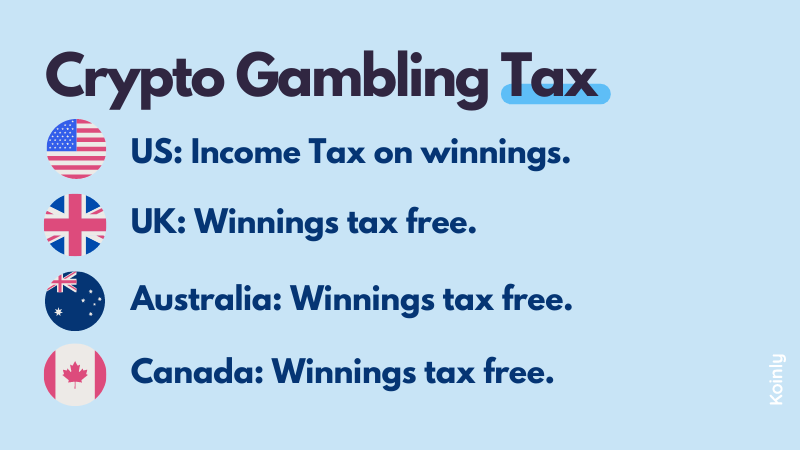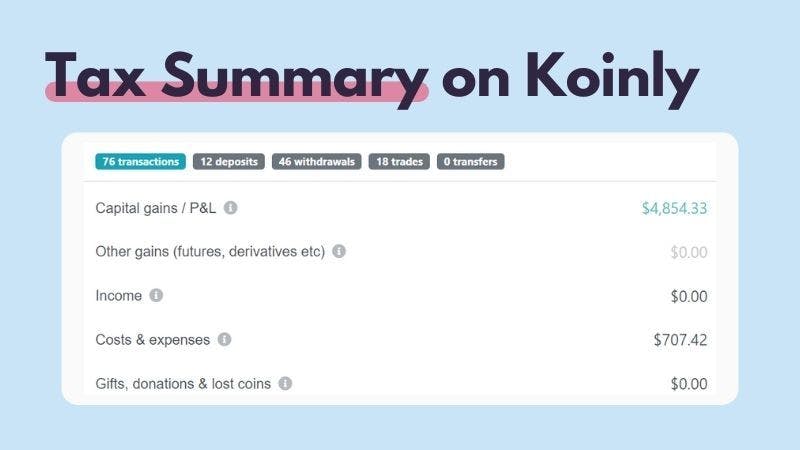Crypto Gambling: Ultimate Guide
Crypto gambling is a popular pastime for investors, with the global crypto gambling market size estimated to reach more than $90 billion by 2024. Whether you're looking to win big by betting crypto on the Super Bowl or simply passing the time while you hold, there are plenty of Bitcoin casinos to pick from. But as with all things crypto, crypto gambling comes with its risks (and taxes). In this guide, we're looking at everything you need to know about crypto gambling, including the hazards involved, how to find the best crypto gambling sites, whether crypto gambling is illegal, how you might be taxed if you manage to win anything, and more. Let's go! 🎰
What is crypto gambling?
In the same way you can head to the casino in your city and spend those hard-earned dollars, you can head to a Bitcoin casino online and gamble your crypto there. There are even a couple of Vegas casinos - like the D in Las Vegas - that accept Bitcoin too.
Crypto gambling works the same way as gambling with dollars, pounds, or any other fiat currency - you place your bet and you win or you lose. It’s not a new concept either.
SatoshiDice was one of the first Bitcoin gambling sites to launch back in 2012 - where hundreds of thousands of Bitcoins were gambled away (back when they were worth very little!). Bitcoin gambling is still going strong a decade on. Just recently, rapper Drake won $1.2 million of Bitcoin on his Super Bowl LVII bet on the Kansas City Chiefs.
Nowadays, crypto gambling is a big business, with the global crypto gambling industry predicted to hit more than $90 billion by 2024. There are thousands of Bitcoin casinos to pick from, as well as other crypto casinos that accept popular altcoins like ETH, XRP, DOGE, and more. But be warned, the market is rife with scams, from dodgy crypto gambling sites that won't let you withdraw your winnings to phishing scams to get you to share sensitive information - investors need to be extremely cautious in this market.
How to find the 'best' crypto gambling sites
Just a quick Google search will reveal hundreds of lists of the best crypto and Bitcoin gambling sites in 2024. These are the sites most commonly mentioned in the best crypto gambling sites round-ups in 2024:
BC.Game
MyStake
Bets.io
Vave Casino
Chipstars
Lucky Block
BetOnline
Cloudbet
MetaSpins
But just because you've seen a site in a list doesn't make it safe to use. Indeed, many of these lists fail to mention the many risks of crypto gambling and may have been financially incentivized to add certain sites to the list. You should always do your own research to find safe and reputable crypto gambling sites yourself.
As a minimum, we recommend the following when you're researching the best crypto gambling sites:
Check any restricted countries. Many users set up accounts without KYC on a given crypto gambling site just to find out later on that they can't withdraw their crypto as they're based in a restricted country - according to the platform. Always check whether your crypto gambling site operates in your country and complete KYC early to avoid withdrawal issues.
Check their license. Many crypto gambling sites are not licensed to operate - particularly in certain states in the US. These sites may be forced to withdraw services or freeze funds quickly.
Get a recommendation from other players. It's worth considering recommendations from people you trust.
See if they have a responsive customer support team. Many of the complaints around crypto gambling sites revolve around poor customer service, with slow or no responses to issues. Check whether there's an active customer support team before you deposit any crypto.
Check Trustpilot, Reddit, and other community-led platforms. If you can't get a recommendation from someone you know and trust, looking for recommendations on Reddit or checking reviews on Trustpilot can help you spot crypto gambling sites with less-than-stellar reputations. A word of warning though - even these platforms aren't immune to fake reviews or astroturfing.
What are the advantages of crypto gambling?
Crypto gambling has helped the online gambling industry grow considerably in recent years thanks to the general benefits that come from cryptocurrency transactions including:
Faster deposits and withdrawals than traditional payment processors
Multiple payment methods, wallets, and currencies supported
Stronger blockchain security practices
Open-source, decentralized platforms
Verifiable transactions available on a public ledger
What are the risks of crypto gambling?
As with all things crypto, crypto gambling isn't without its risks, including:
High risk of fraud due to an unregulated market
Limited reputable and verifiable platforms
An attractive target for crypto scammers and hackers
Many crypto gambling sites reportedly refuse to pay out winnings
False or misleading advertising - in particular, bad marketing practices led by online streamers promoting specific crypto gambling platforms
Confusing licensing can lead to users being locked out of accounts
Lack of protection due to minimal regulation
What can you do if you're scammed by a crypto gambling site?
Unfortunately, there's very little recourse for investors who fall foul of a crypto gambling scam. You can report to your national police authority, but due to the borderless nature of crypto transactions, there's often very little these authorities can do other than file a report and there's no guarantee you'll get your crypto winnings or your original deposit of crypto back.
Is crypto gambling illegal?
It depends on where you live.
Some countries have no issue with crypto gambling and haven’t released any regulation on it - so in places like the UK, Australia, and Canada, crypto gambling is legal. Meanwhile, in countries where crypto is illegal in general - like China, Egypt, and Qatar - crypto gambling would also be illegal.
The US in particular has taken a confusing stance on crypto gambling. There is no specific legislation on a federal level around crypto gambling. However, there is extensive state legislation around online gambling in general.
For example, online gambling is completely legal in Connecticut, Delaware, Michigan, New Jersey, Pennsylvania, and West Virginia. Meanwhile, other states have specific rules around it like only online sports betting in Oregon and Indiana. Other states have kept online gambling illegal outright.
What this means is crypto gambling isn’t regulated and strictly legal, but it’s not prohibited either. Many reputable crypto gambling sites will have a privacy policy and terms of service that will clarify any concerns over you using their services.
Did Twitch ban crypto gambling?
No, Twitch hasn't banned crypto gambling - context is everything.
Part of the reason crypto gambling saw a surge in popularity in recent years was due to the advertising practices used to promote specific gambling platforms. Many popular Twitch streamers were sponsored to play and effectively promote a variety of crypto gambling sites throughout 2022. While Twitch generally allows gambling streams, many of these crypto gambling streams failed to disclose sponsorship, age restrict to an appropriate audience, and even encouraged practices like using VPNs to access sites that were not operational in the US.
After a high-profile campaign from other Twitch streamers who wanted to promote better advertising practices on the site, Twitch announced in September that it would update its policies, including prohibiting gambling sites that aren't licensed in the US or other jurisdictions that provide sufficient consumer protection. So while some crypto gambling sites - including Stakes.com, Rollbit.com, Duelbits.com, and Roobert.com - are now banned from Twitch, it's not an outright ban on streaming crypto gambling. It is however undeniably a hit to the industry.
Crypto gambling tax
A big win may come with a big tax bill - but it all depends on where you live.
No tax office has issued guidance on crypto gambling winnings just yet. However, there are extensive guidelines on crypto taxation in general, as well as gambling tax in general. The type of tax you’ll pay depends on the transaction you’re making. There are only a few transactions we need to look at in regard to crypto gambling taxes:
Betting your crypto.
Winning crypto.
Selling your winnings for fiat currency.
Each tax implication is different, so let’s break it down.
Betting crypto tax
There is no clear guidance on betting crypto and how it would be taxed. Arguably, it could be seen as spending your crypto on goods or services - which is subject to Capital Gains Tax. But as you may get nothing in return, it’s a grey area. There is an argument you could feasibly write it off with no realized loss or gain.
Crypto winnings tax
When it comes to winning crypto, similarly there’s very little guidance from a tax perspective for crypto winnings. There is however extensive guidance on gambling winnings in general and it all comes down to where you live. For example:
US: Gambling winnings are subject to both Federal and State Income Tax.
UK: Gambling winnings are tax free.
Australia: Gambling winnings are tax free.
Canada: Gambling winnings are tax free.
 It’s bad news for US investors, but good news in most other countries. However, you likely won’t want to keep your gambling winnings in crypto - so what happens when you sell your crypto winnings for fiat currency?
It’s bad news for US investors, but good news in most other countries. However, you likely won’t want to keep your gambling winnings in crypto - so what happens when you sell your crypto winnings for fiat currency?
Selling crypto winnings tax
When you sell your crypto winnings, you’ll pay Capital Gains Tax on any capital gain. This is the difference in value between when you acquired your asset and when you sold it.
This gets complicated due to the cost basis. Your cost basis is how much you spent on your crypto. Arguably, when it comes to gambling winnings - you have a cost basis of zero. So potentially, your entire crypto winnings could be subject to Capital Gains Tax in countries like Canada where they use an adjusted cost basis method. You can find out more in our cost basis guide.
Koinly makes crypto tax simple
Whatever your crypto investments - whether it's gambling or trading - the tax man will want a cut. But Koinly can save you hours of maths and spreadsheets.
All you need to do is sync the wallets and exchanges you use using API or by importing a CSV file of your transaction history. Once you've done this, Koinly will calculate your capital gains, losses, income, and expenses across all the platforms you use. You can see this in your tax summary - all on our free plan.
 If you'd like to download a tax report, upgrade to a paid plan from $49. We offer a huge variety of tax reports from around the world, ready to hand over to your tax office - for example, the IRS Form 8949 and Schedule D, the ATO myTax report, and a HMRC Capital Gains Summary. All you need to do is hit download and add it to your tax return.
If you'd like to download a tax report, upgrade to a paid plan from $49. We offer a huge variety of tax reports from around the world, ready to hand over to your tax office - for example, the IRS Form 8949 and Schedule D, the ATO myTax report, and a HMRC Capital Gains Summary. All you need to do is hit download and add it to your tax return.




